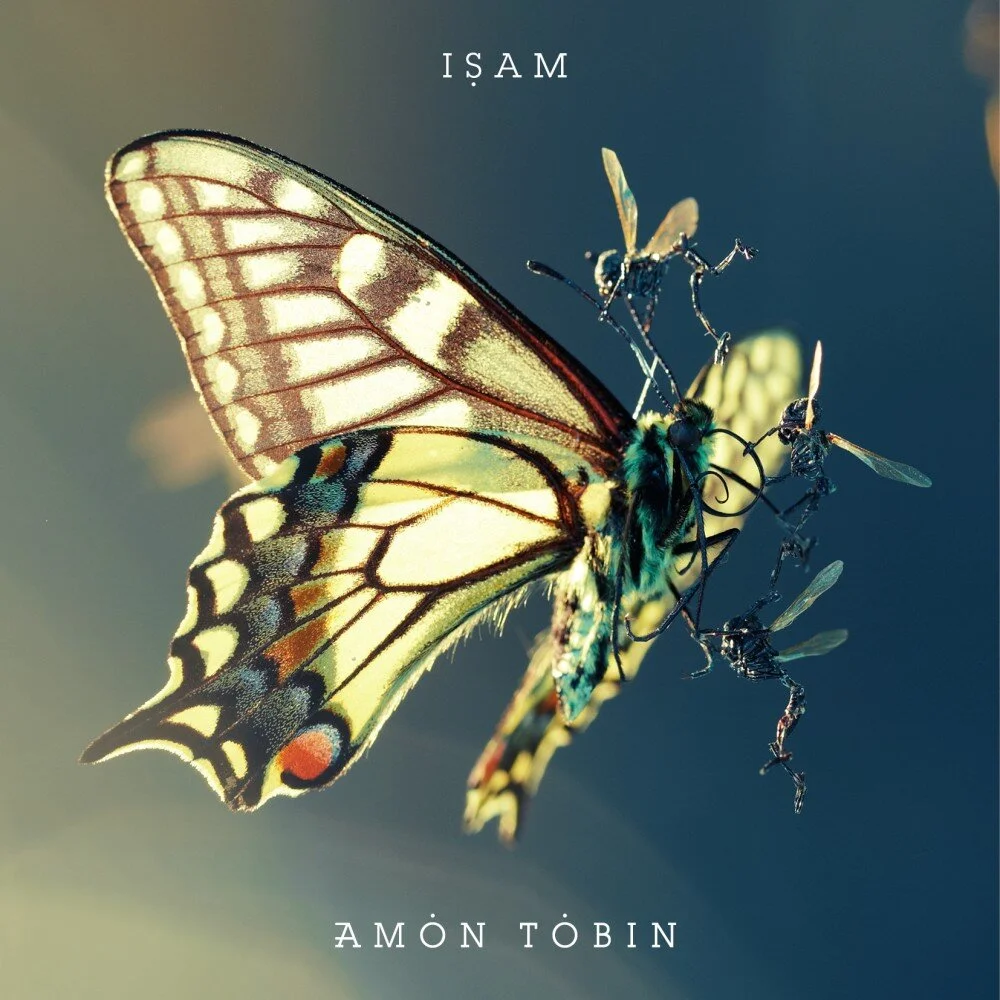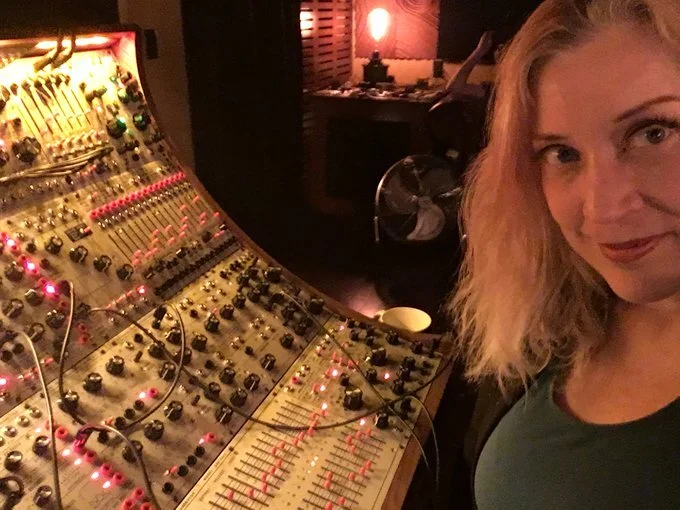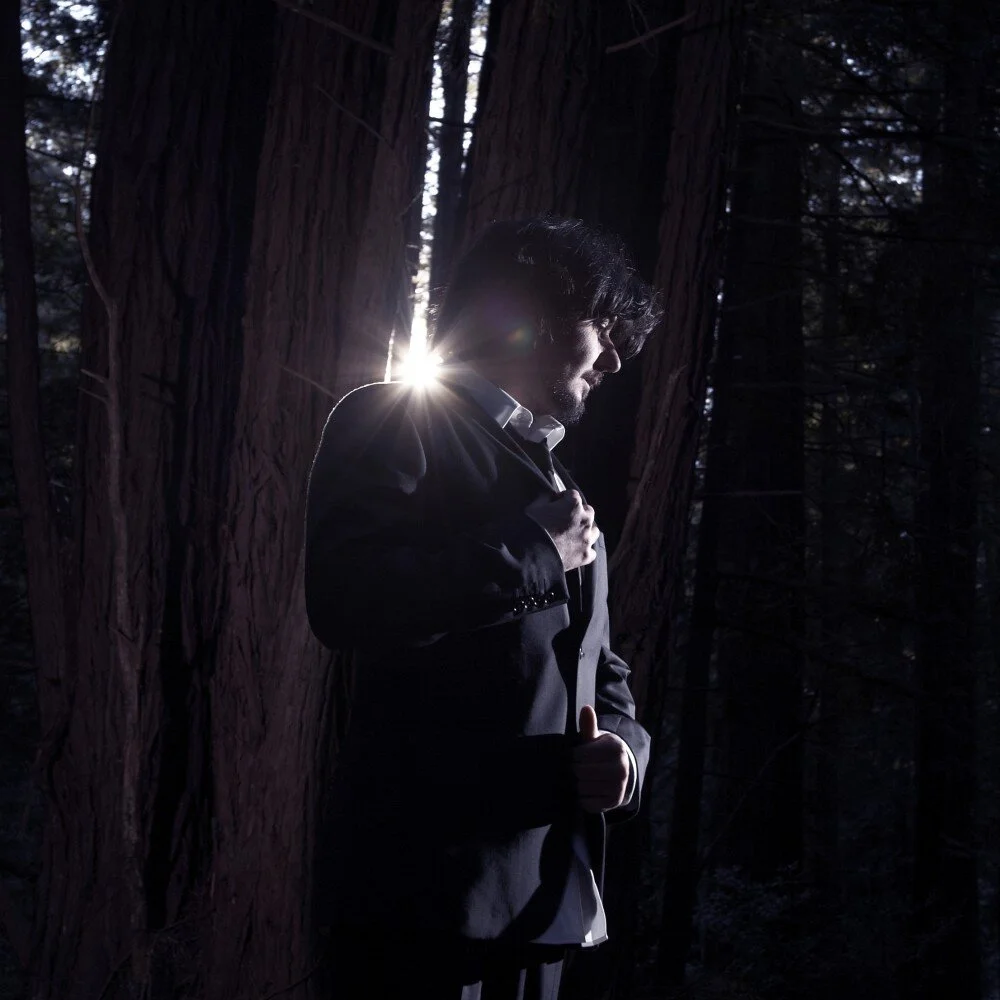Amon Tobin
figueroa
by Mister Mime
September 7th 2020
Amon Tobin is an auditory ninja who can freeze, flow or even evaporate sound, transfiguring it in unnatural ways. The inventive producer has been at the forefront of cutting edge productions spearheaded by his signature cybernetic sounds of the future. He can make drum and bass with a toaster, or glitch with a guitar. The question for him seems to be not 'Why?’ but rather, “Why Not?”, and he will go to any lengths to understand the world around us and the true nature of sound, especially if it means having to push the boundaries of the same.
His new alias “Figueroa" sees him manifest psych-rock folktronica in a truant manner: without any acoustic instruments, rather synthesising all the sounds through machines, making for an antagonistic attempt at an album that has a characteristic desolate and eccentric zeal. Could the title be some kind of unintended allusion to the current circumstances of the world heralding a change in the existing paradigm? I have an unnecessary habit over overcorrecting any dots that I am presented with, and this time I will save us all the trouble so that we can savour the music for just what it is and the feeling that it brings. The record nevertheless comes together with a grim, cinematic elegance.
Being an accomplished virtuoso in the field of electronic music and a relative novice as a singer/songwriter, “The World As We Know It” is a gallant exploration of this domain by the artist who has never held back in his creative expression, and neither should we. While it could conjure up scenes in your mind of a singer-songwriter strumming country chords on an old acoustic guitar to ballads of heartbreak and paranoia in a dusty rural Mexican or Texan village, it exists as a non-definable yet definitive statement from an artist who never ceases to push his own boundaries, and sail his ship into relatively unknown waters. This valiant quest has definitely been more bounteous and liberating than any of us could have anticipated, least of all Amon himself.
AT: Hi there! Can you hear me okay?
MM: Hi Amon! Yes I can. I’m just going to adjust my audio settings.
AT: Do you know what, I’m going to adjust my audio as well…let me see, microphone, speaker, that seems to be working more or less. I’m just going to turn that down so you don’t get any feedback. Full on professionals is what we are mate! So how are you this morning? Where are you calling from?
MM: Haha most certainly. I’m calling from Mumbai, India.
AT: Ah I see! that’s amazing! How’s life over there man?
MM: Not easy, but we are getting along.
AT: Yeah well, we are all in the same boat. And that’s a comfort in itself, at least.
MM: They say that musicians and producers are sort of equipped to deal with this sort of a situation, since we are used to sitting indoors for long hours without any social interaction.
AT: That’s funny, people say that to me. They are like,”Hey, you know, this must be fine for you cause you’ve been self-quarantining for a year”. And I always think, I’m going to remember that. If I ever go to jail, I’m going to tell that to the other inmates. Nah but honestly, I am. I’m luckier than most, and I feel pretty fortunate. I’ve got everything I need to be happy right here, and now I don’t have the guilt of not going out. So yeah, I think this could be a lot worse.
MM: I believe different people are dealing with this time in different ways. How has this year been for you so far?
AT: Much the same as you I suppose. I feel like we have a limited agency in what happens. What we do have some influence on is how we deal with that. I’m trying to deal with it as positively as I can, and be constructive. I’ve just been keeping my head down and making a lot of music, which I’m always doing anyway. I’m in here trying to be productive and optimistic, and focusing on the things that I do have rather than the things that I’m missing. I think that helps a lot in a general sense. We can spend a lot of time and energy lamenting the gaps in our lives. So like I said, we should focus on what’s working for us.
MM: Right. Thanks for being on board with this! It’s an honour to speak with you, especially in the light of your new record.
AT: Thank you. Is that a drum kit behind you?
MM: Yes it is. And I’ve also been using this time to make electronic music as well. It’s been a lot of fun failing quite miserably in my initial attempts.
AT: Of course.
MM: Well, let’s get into the album! Can you tell us where the name 'Figueroa' comes from?
AT: It’s actually a street down the road from where I live. It’s a long street that stretches through a good part of LA actually. There’s a colourful meaning in the Urban Dictionary as well which I was happy with. I’m always happy when the Urban Dictionary doesn’t have a terrible meaning for something that I’ve named. Honestly I name things pretty arbitrarily, I always have. I don’t put too much stake into the names of my albums.
MM: What I found on Google was that ‘Figueroa’ was the name of a street in Argentina, and I was wondering if there was any connection. The naming of tracks and albums is one aspect that I’m curious about.
AT: Naming tracks has always been a chore for me. I would number them if I could. I feel that it’s a shame to limit anything to a definition. You can leave things open for people to have their own experiences. I feel like ambiguity is our friend, so I try to avoid as many definitions and labels as I possibly can. Of course for practical reasons, you have to name your albums and your tracks. So I also try to have fun with that and enjoy the process of being cryptic or poetic.
MM: So is this the street that you walked through frequently since the lockdown and everything, and that’s why the name stuck with you?
AT: Yeah I’ve seen it pretty much everyday, and it ties in with the album in some respect because a lot of the music I was listening to when I was making this record was Mexican folk music. I was driving around in Northern California listening to all these harmonies and being fascinated by them. California is extensively, Mexico, and here I am. I feel like the landscape and the people, it all seeps into what you do whether or not you’re aware of it. So it just seemed fitting to pay some homage to that fact in titling the record. Like I say, agin, it’s a very superficial link. It certainly isn’t the core of what this record is about for me.
MM: And what about the tracks? Are there any particular stories behind them?
AT: That’s a little different because the tracks actually have lyrics so it describes something. So there was no way of getting away from the narrative in that sense. I mean, there’s still some degree of ambiguity in the lyrical form of it but the titles are descriptive of the theme of each song, as much as they can be. There are some stories in some of these songs. They describe a lot of the things I was thinking and feeling at the time when I wrote them.Some of them reach back to the things that I experienced before. The one track,’Better Run’ is talking about what happened to me at school, when I was a kid. I don’t know if you’ve ever been wrongly accused of something. It’s a very difficult feeling to reconcile.
I was wrongly accused of stealing a bicycle or something. And I remember I was just playing ping pong or something at break time, and next thing I knew, I saw my parents walking along the window and then I was in the headmaster’s office and there were police there. It was like an open and shut case that I’d stolen this thing, and I had no idea what anybody was talking about. But it was very much a conclusion that had been reached and now it was just about what degree of punishment should be thrown my way. It was this horrifying experience, the kind that are maybe small in your life but some of them stick with you. So, yeah, there are some stories in the tracks. I remember when I made these tracks, I had no intention of releasing them. So the idea was just to make them and learn about chords, melody and a different way of writing music for me. I never really approached it with respect to other people interacting with them, trying to figure out what I was talking about, or even hearing them at all.
MM: When put next to your older work like ISAM, which I heard many years ago, it does feel very personal. This album and project was different in the sense that you donned a new hat for this, and completely changed the paradigm. What was the musical mood or personality that you adopted for this record?
AT: I’ve been really interested in so many different kinds of music since I began making music, and I realised at a certain point that all my interest couldn’t be housed under the same roof. So my plan was instead of trying to cram it into the same house, I built different houses for these different things to live in. They would all live and develop in parallel, as opposed to having an interest that dies and then you have a new interest. And then that dies and you have a new interest. All these interest are perpetuating and carry on developing in parallel. ’Two Fingers’ for example goes right back to my childhood.
I grew up with hip-hop and it was a huge part of my teenage years. And so, that lane lives through ’Two Fingers’ and keeps developing there. My own sort of peculiar fascination with sound and the construction of sound lives on through the stuff I do under my own name. And ‘Figueroa’ is a lane I’ve carved out to explore songwriting in a sort of lyrical way, but also a way that is less about futuristic sound and more about just songwriting. At the end of ‘ISAM’, which was a kid of technical achievement for me, something that was very much for me to do with making the sounds of the future, sounds that have never been heard, and I went to great lengths to construct these things. It was a sense of personal achievement in a technical sense. And even though there happens to be a lot of technical challenge in ‘Figueroa’ because it was all done electronically, that wasn’t what the record was meant to represent. It was about a different kind of exploration, something that was not trying to make the sound of tomorrow, but just expressing something very simple.
MM: How was it to work as a singer and songwriter and put out that part of yourself to the world?
AT: It is terrifying because as I said, I didn’t make the record imagining people’s response to it. So I let myself feel very free while making it. I had made all these tracks much earlier and almost 10 years later I sent them over to Sylvia Massy thinking maybe she would know someone who can actually sing and play guitar, and could perform these songs. She’s an incredible producer who has worked with Prince and Johnny Cash. And she was so enthusiastic about them as they were that she convinced me to go and record them with her at Capitol Records. So we recorded some of the songs, their vocals, at Capitol. So for me, it was a really intimidating experience because not only did I feel unqualified to be singing, cause I’m not a singer and I can barely project my voice. The reason my voice sounds the way it does on the record is because that’s all I can do. So there was this amazing producer, and all these incredible microphones, and I felt very much out of my depth, which, as it turns out, is a very healthy place to be. And I’d recommend it to anyone.
Sylvia Massy
MM: Would you consider your different musical aliases/projects as a musical schizophrenia, but in a good way?
AT: I feel as though identity is something which we’re more concerned with when we are younger. At least speaking from my own experience. When you’re young, you’re trying to broadcast something about your personality, who you are, who you aren’t to be seen as, and the music acts as a way to amplify that, like “This is who I want to be seen as”,”This is the kind of music that person listens to”. It’s also a way to fit into a group that you feel accepted by. So when you’re forming your identity, I think that’s much more important. And as you grow older as I have, those things become less important. You’re more established with who you actually are. You have a better understanding and you feel less inclined to broadcast that. I don’t feel the need to affiliate myself with this genre or that genre of music to describe something about myself. I know who I am. So now, I am much less interested in the confines of genre, and I’m much more interested in the structure of sound, how rhythm works, how melody works, timbre, etc. Do you see what I mean…it kind of becomes redundant, the idea of this style of music and that style. The only reason I even separate them as aliases is to be fair to the listener. It’s not fair to give them a new record that has nothing to do with what you did before.
MM: With respect to your personal and musical identity, you were born in Rio. And you moved to the UK when you were younger?
AT: Not exactly, there were lots of places. It was a very odd childhood. My mum and I, we moved from Brazil and we lived in lots of places, Amsterdam, Morocco, at least 4 different countries for small amounts of time before I was about 10. Then we went back to Brazil. My mum met my step-dad in Ireland, who is my real dad, really, and he came back with us to Brazil, and then we moved back to England after that. So it’s been a long and winding road.
MM: I see. Just to make it a bit more specific, I’d like to ask you have much have you managed to connect with or been influenced by your Brazilian roots and Brazilian music? And have you taken much of that back to your identity as an electronic artist?
AT: The music I make is not too concerned with describing myself. It’s more about exploration in a general sense. So I feel less inclined to describe myself in my music, and I frankly don’t have a great interest in the anthropology of music, and describing my roots as having an influence. The thing is, I feel like whether you like it or not, where you come from and your environment affects what you do. I feel not too interested in describing that because it’s not something I think about consciously. I don’t make music thinking that I’m a person born in Brazil. That’s just cause my own experience has been very peculiar in terms of how many places I’ve lived in. So if anything, it would feel disingenuous to align myself to a culture, and to have that sense of legitimacy.
I think everybody is on an even sort of field these days. We are all on the internet, and we all have access to music from all around the world. I may not have had the experiences of somebody who has lived in a particular place. But the beauty of that I feel, I have a huge Bollywood collection, and one thing I’ve noticed was that a lot of what had happened in the music, in some records, was a kind of glorious misinterpretation of some Western music.
So that misinterpretation I feel, creates this incredibly new and wonderful thing. I’m talking about some specific ones. I have one that was very hip-hop based, and one that was sort of funk based. And it was then recontextualized in a way that could only have happened from people who never have necessarily gone to Brooklyn for instance. But, the beauty of that was that there was then a new layer mapped onto that thing, and something entirely different was born that has it’s own value, which I really appreciate. So, I have a similar experience with, let’s say Blues music. I have nothing to do with that music or culture. But when I put something that comes from Blues in my music and do so in exactly the same way,
MM: Yeah absolutely, one thing that comes to mind is the story of Charanjit Singh, the record ’Ten Ragas to a Disco beat’ and Acid House music.
AT: This is exactly what I’m talking about! When you look at genres in Western music as well, they’ve done the same thing with Indian music. I’m thinking about a lot of the rhythms that were adopted in Jamaica, Dancehall stuff, and things that took a really direct influence from Indian and Eastern music. And then American producers took that and made it something, Then you have Timbaland making Missy Elliot beats which go via Jamaica back to India. So again, this kind of misinterpretation happens from each country having a very rich musical culture and heritage. And that ‘Chinese Whisper’ effect is quite glorious, I love it!
MM: Yes, absolutely. In a lot of ways I think it is technology and the internet that has really accelerated that process. What is you take on technology in music, as well as electronic music? I’ve asked myself this question many times, and I feel you would be one of the most qualified people I could about this. There has been this whole thing about electronic music, like,”Is it really music?” or “Are you really playing the music or just pushing buttons?” As someone who has really done justice to Electronic music and making music through technology and machines, how do you manage to put intent behind each and every sound? The electronic music predicament is that of “Too many choices” or “Being too easy”. How can we approach electronic devices as musical instruments and learn to connect our hearts, minds and soul with the machines?
AT: That’s a really interesting subject actually, and there are a few aspects to that. I feel like the most useful thing to acknowledge to begin with is that creatively, the only thing that I believe we can really take credit for, are the decisions that we make, in terms of what we leave out, what we put in, and their effects. This this has happened, what happens or doesn't happen next. And that can be applied to anything that you do creatively, regardless of the tools you're using and whether they’re electronic or acoustic. That is your creative merit. That’s what you can actually bring to the table. The chords already exist, the notes already exist, the instruments exist, and you have no part of that. What you have a part in are the decisions that you’re making.
Also, there’s a funny interview with one of the band members from Pink Floyd when they were doing ‘Live in Pompeii'. They were using a lot of synthesisers and they were one of the first people to adopt that introduce this into rock music. There was a music journalist who was sort of sneakily asking them this question,”So you’ve got this computer and synthesiser in your music. Isn’t it just making the music for you? What’s going on with that? Isn’t it some sort of cheating?” And the response was so great, he said,” You know, actually I think it would be very interesting to give the same synthesiser to a dozen different people and see what everybody does with it. And I’m pretty sure we would do something better than they did.” Which I always thought was kind of a perfect way of describing that. All this attention is given to the tool and in the end it’s pretty irrelevant. Bottom line is, technology needs creativity. It’s not the other way around.
MM: Yes. the focus should always be on the music and the intent or message behind it, be it with machines, or sticks and stones.
AT: The problem is I think that the people who are selling stuff to you want you to believe that there are things that are attainable that maybe aren’t. So they’ll say look, if you are not so confident as a creative person, here’s a thing that will make you sound like some other person. Here’s an interface that will make you feel like you are navigating a nuclear submarine, because it’s so colourful and it has so many graphs, and it will give you a sense of importance. And all of these things are marketing, really, and in the end, any instrument is as good as the person using it and technology, I believe, is no different at all in any sense.
MM: So in this album, you sort of reverse engineered the sound of acoustic instruments, or something towards that end, using electronics. Very few artists even attempt this sort of thing. In acoustic or instrumental music you have the tendency to play in such a way that sounds “Perfect” like it’s made by or on machines, and also tools like quantisation, pitch correction. And there are a few producers who can use machines to make something that sounds “real” or “organic”. In fact, that process is one of my big interests. We have the machines, we have the technology, now how can we use them in the best way possible and sound sincere? About programming the ‘guitars’ for instance, like you said, it would probably have been easier for you to just learn to play the guitar but this was your process. Can you tell us about this reverse engineering aspect?
AT: The objective for me is to try and gain an understanding of an instrument. So whenever you're synthesising something or even, as in this case, trying to manipulate an electronically controlled sound to behave the way an instrument works, what you’re doing is listening and discovering something about that instrument. If we took an analogy like computer rendering for example, when you’re trying to make a convincing render of an object in a 3D space visually, what it’s forcing you to do is look at the physical properties of that thing in real life, how does it behave, what are the physics involved, how does light hit it, how does light behave and interact with the object. And it’s a similar thing, you’re discovering the world around you by trying to emulate it in a synthetic way or in a mechanical way.
And so, I’ve always found that to be my drive, to understand the world around me, and what comes out is the music as a sort of by product of that. So in a sense, what I was doing with the guitar thing , you know, cause there are lots of guitar VSTs, in the same way that there are strings and Orchestra, and the point is you can legitimately play a single note from any of these computer programs and it’ll be a very convincing note, but the moment that you really start to understand how these notes interplay together and how the rhythms work, then you get into a much more nuanced observation of how these instruments really behave. And that’s what I found interesting. And to do in any convincing way, you have to get into quite some serious programming. But it’s important to know that the objective isn't to make a substitute for the “real instrument”.
Just like with rendering, the end result isn't to make a perfect copy of something that already exists. Why bother? It already exists, just look at that. The point is, once you render it, you can then do impossible things with that. Same with a sound, once you make a convincing model of something that exists in the real world, you can then bend it and shape it do do things that the object in the real world may not be able to do. And that’s what I’m aiming towards. There are a lot of things in this album that sound like it’s a guitar playing, but there are smaller things that are quite different as well. That’s what I’m trying to get across. I worry sometimes that people misunderstand what that’s about like,”Oh its trying to replace guitarists”. You can never replace guitarists and that’s not the point.
MM: Yeah absolutely. When I heard the first track, it was kind of familiar but as I listened to the rest of them, I did hear the things that you mentioned, the little details and small subtleties that sound like guitars but there’s definitely something different. I hope we get to hear more of you singing, and of this project.
AT: Thank you! I’m going to practice.
MM: You’ve been a prolific producer for many years now. I ask you this on behalf of myself and many other producers, friends, here in India and around the world : How do you balance the music and production, you know, just physically sitting in the studio on your computer and looking into the screen, with your personal life and the self care aspects?
AT: Hahahaha….well it turns out that balance doesn’t really produce anything too worthwhile in my experience. I think you need to come to terms with a certain degree of…sacrifice is again a very dramatic word but…what I’m saying is that you have to give something up. You can’t do everything and have everything. So thought my life, yeah, relationships have suffered, and my health occasionally. I’m fortunate that right now I’m relatively healthy, but of course you can't do everything. I have no regrets, I make the decisions and I’m committed to them. But yeah, you can’t be compulsively obsessed about something and also have a healthy balance of existence. I’m not advocating this as a lifestyle choice by any means. It’s just that I find it worth it for me.
MM: What advice would you have for all the producers out there reading this?
AT: The things that I feel I wish I had been encouraged to do more earlier on is to just really not listen at all to people who tell you what you should be doing, especially within like a “Stay in your lane” kind of thing. I really feel like it can have a negative impact on people to hear and have a sense that there are limits to what you should be interested in. You should rail against the people who try and confine you, that tell you that you can exist within this sphere and no further. Just don’t conform, is what I’m trying to say, to whatever it is. Even if it’s to non-conformity. Don't conform to that either.
MM: Thanks a lot for your time and your words!
AT: You’re welcome. I must come to India one day!
MM: Most definitely. We would love to watch you play here! And India itself is crazy and amazing. You must definitely visit sometime.
AT: Thank you man. Take care.
You Can Follow Amon Tobin on:
https://soundcloud.com/amon-tobin
https://www.facebook.com/amontobinofficial/
https://www.instagram.com/amontobin/
https://www.youtube.com/channel/UCxD2f0Xh4WlcKJO9W8nIOWA
All Images courtesy of Amon Tobin









